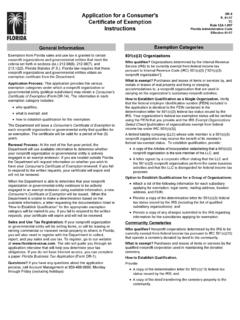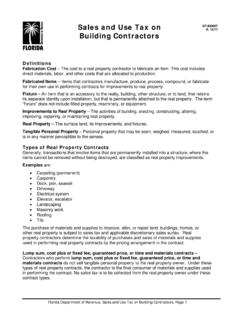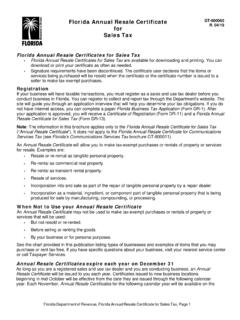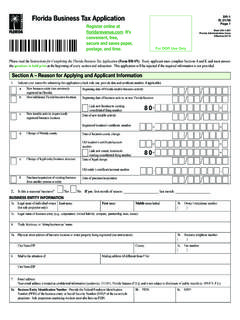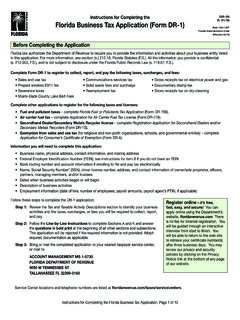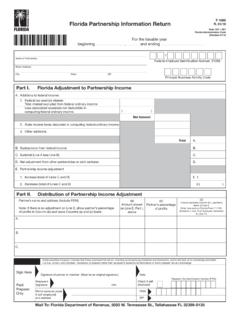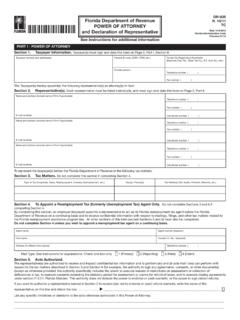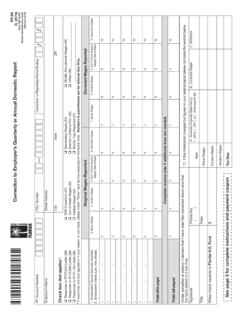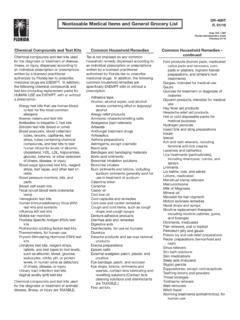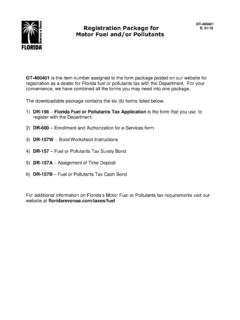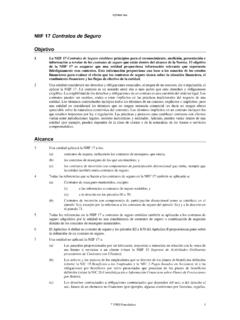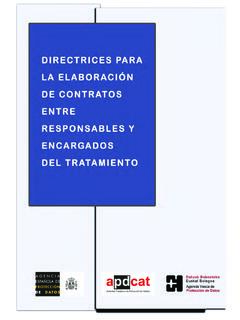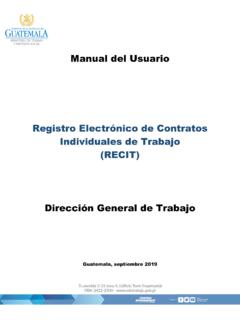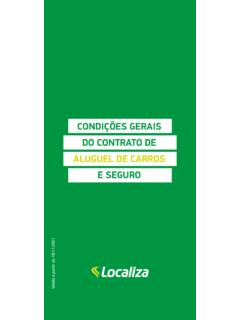Transcription of Sales and Use Tax on Rental of Living or Sleeping ...
1 Sales and Use Tax on Rental of GT-800034. R. 01/18. Living or Sleeping Accommodations What is Taxable? Florida's 6% state Sales tax, plus any applicable discretionary Sales surtax, applies to Rental charges or room rates paid for the right to use or occupy Living quarters or Sleeping or housekeeping accommodations for Rental periods six months or less, often called transient Rental accommodations or transient rentals. Some examples are hotel and motel rooms, condominium units, timeshare resort units, single-family homes, apartments or units in multiple unit structures, mobile homes, beach or vacation houses, campground sites, and trailer or RV parks. Individual Florida counties may impose a local option tax on transient Rental accommodations, such as the tourist development tax, convention development tax, tourist impact tax, or municipal resort tax.
2 These taxes are often called local option transient Rental taxes, and are in addition to the 6% state Sales tax and any applicable discretionary Sales surtax. In many counties, the local option transient Rental taxes are reported and remitted directly to the county; however, Sales tax and discretionary Sales surtax on transient rentals are always reported and remitted to the Department of Revenue. Visit for: Discretionary Sales Surtax Information (Form DR-15 DSS): This form provides surtax rates for each Florida county. County Local Option Transient Rental Tax Rates Grouped by Administration (Form DR-15 TDT): This form provides local option transient Rental tax rates for each Florida county and whether the local transient Rental tax is remitted to the Department or directly to the county.
3 For information on reporting and remitting the local option transient Rental tax directly to the county, contact the local county government. What is Exempt? Rental charges or room rates paid by a person who entered into a bona fide written lease for continuous residence for a period longer than six months are exempt. When any person continuously resides at one transient Rental accommodation and pays the state and local taxes imposed on the accommodation for the first six months, additional Rental charges or room rates for that person at that location are exempt. Rental charges or room rates paid by a full-time student enrolled in an institution offering postsecondary education are exempt. The student must provide the owner or lessor of the accommodations a written statement, issued by an official at the student's institution, confirming that the student attends the institution full time.
4 Rental charges or room rates paid by military personnel who are on active duty and present in the community under official orders are exempt. Military personnel must provide the owner or lessor of the accommodations a copy of the official orders or an overflow certificate issued to active duty military personnel making it necessary to occupy the accommodation. Trailer Camps, Recreational Vehicle Parks, and Mobile Home Parks Rental charges for accommodations at trailer camps, recreational vehicle parks, and mobile home parks (except certain mobile home lots) are taxable. When more than 50% of the total Rental units available are occupied by tenants who have continuously resided there for more than three months, the owner of the camp or park can file a Declaration of Taxable Status - Trailer Camps, Mobile Home Parks, and Recreational Vehicle Parks (Form DR-72-2) with the Department to declare that the Florida Department of Revenue, Sales and Use Tax on Rental of Living or Sleeping Accommodations, Page 1.
5 Exemption requirement has been met and the transient Rental charges at the park or camp are exempt from the transient Rental taxes. This exemption does not apply to other taxable Sales or rentals at the camp or park. Owners of tax-exempt camps or parks are required to make an annual determination of their tax-exempt status at the end of each accounting year and notify the Department when they no longer meet the requirements. The transient Rental charges at the camp or park become taxable on the first day of the owner's succeeding accounting year. Florida law requires mobile home parks with 10 or more mobile home lots to be rented or leased for periods of at least one year. The Rental or lease of lots within these mobile home parks is exempt.
6 The owner is not required to file Form DR-72-2 to declare the rentals or leases for mobile home lots within the park tax exempt. Who Must Register to Collect Tax? If you collect or receive Rental charges or room rates for Living quarters or Sleeping or housekeeping accommodations for Rental periods six months or less (transient Rental accommodations), you must register with the Department to collect, report and remit Sales tax and surtax, plus any local option transient Rental tax that is collected by the Department. (Transient Rental tax collected by the county is reported to the county.) Each transient Rental accommodation is required to be separately registered by the owner or the owner's agent who collects and receives Rental payments on behalf of the owner.
7 You can register to collect, report and pay Sales tax, discretionary Sales surtax, and transient Rental tax collected by the Department online at The online system will guide you through a series of questions that will help you determine your tax obligations. If you do not have internet access, you can complete a paper Florida Business Tax Application (Form DR-1). As a registered Sales and use tax dealer, a Certificate of Registration (Form DR-11) and a Florida Annual Resale Certificate for Sales Tax (Form DR-13) will be mailed to you. If you are not filing electronically, paper tax returns will be mailed to you. The Certificate of Registration must be displayed in a clearly visible place at the location of the transient Rental accommodation.
8 The Florida Annual Resale Certificate for Sales Tax is used to lease or rent transient Rental accommodations that will be subleased to others for which you will collect transient Rental taxes. Florida law provides for criminal and civil penalties for fraudulent use of a Florida Annual Resale Certificate for Sales Tax. Any agent or management company who manages a transient Rental accommodation (not an employee of the accommodation owner) and receives Rental charges or room rates on behalf of the owner may register the accommodation on behalf of the owner. The Department provides an Application for Collective Registration of Living or Sleeping Accommodations (Form DR-1C) for an agent who is registering multiple transient Rental accommodations for one or more owners.
9 A Sales and use tax Certificate of Registration will be issued to each owner and mailed to the agent or management company. The Certificate of Registration must be displayed in a clearly visible place at the location of the transient Rental accommodation. A letter containing the certificate number and the name of the registering agent or management company will be mailed to the accommodation owner. Filing and Paying Tax You can file returns and pay Sales and use tax, plus any applicable surtax, using the Department's online file and pay website at or you may purchase software from a software vendor. A list of software vendors is available on the Department's website at Returns and payments are due on the 1st and late after the 20th of the month following each reporting period, whether you are filing monthly, quarterly, twice a year, or yearly.
10 If the 20th falls on a Saturday, Sunday or state or federal holiday, returns are timely if filed electronically, postmarked or hand-delivered on the first business day after the 20th. Florida law requires you to file a tax return even if you do not owe Sales and use tax. Florida Department of Revenue, Sales and Use Tax on Rental of Living or Sleeping Accommodations, Page 2. When you electronically pay only or you electronically file and pay at the same time, you must initiate your electronic payment and receive a confirmation number no later than 5:00 , ET, on the business day prior to the 20th. Keep the confirmation number in your records. The Florida e-Services Calendar of Due Dates (Form DR-659) provides a list of deadlines for initiating electronic payments on time and is available on the Department's website at If you file your return or pay tax late, a late penalty of 10% of the amount of tax owed, but not less than $50, may be charged.
